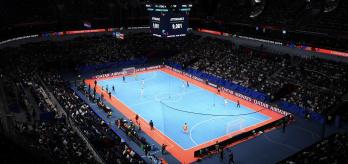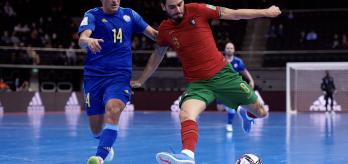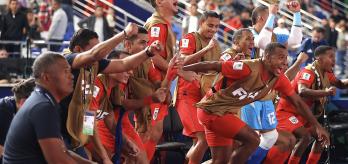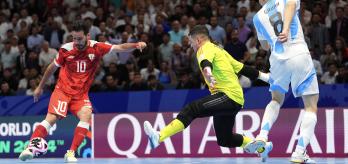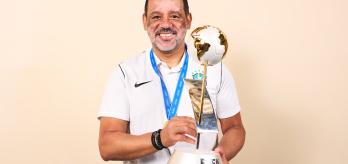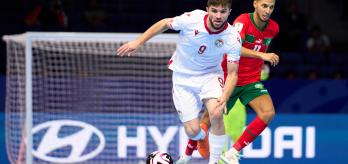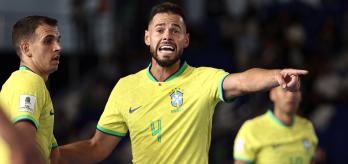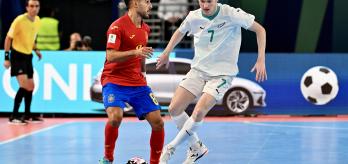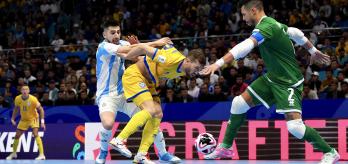On Wednesday, four-time champions Brazil came from behind to earn an impressive 3-2 victory over Ukraine in the semi-final of the FIFA Futsal World Cup Uzbekistan 2024™, booking a place in their sixth final in the tournament’s history courtesy of a brace from captain Dyego in the second period. The following day, Matías Lucuix’s Argentina fended off this year’s surprise-package, France, to set up an all-South American final to be contested on the grandest stage in Tashkent at the Humo Arena. The Technical Study Group (TSG) have put their collective minds together to tactically preview what will likely be a thrilling clash, analysing each team’s tactics in and out of possession as well as their goalkeepers.
The final brief
- The TSG expect a strong passing game from Brazil and a disciplined variation between the 3-1 and 4-0 systems. Manager Marquinhos Xavier is likely to deploy a varied approach with his goalkeepers as well, using Willian’s defensive solidity and Guitta’s technical ability to relieve pressure.
- From Argentina, the TSG anticipate physicality, tenaciousness and organisation. From this solid basis, Matías Lucuix’s team will look to inflict damage with their fast, technical wings and instinctual pivots. Goalkeeper Nicolás Sarmiento provides outstanding distribution and leadership.
- The TSG expect both coaches to take tactical inspiration from Ukraine and France who ran the two sides close in the semi-final. Ukraine’s direct attacks unsettled Brazil defensively while France broke Argentina’s press down with effective dribbling and blind-side runs.
Brazil: A possession-based team with variety
In possession
Marquinhos Xavier has been in charge of the Brazil national futsal team for seven years and knows both the strengths and weaknesses of his players. He has created a squad which is filled with players who are quick and skilful, with even the more defensive players excelling in 1v1 situations. The five-time winners currently rank second for number of take-ons in the tournament, with 76 attempted in total. Furthermore, the coach has forged his side into one of the best possession-based teams at the tournament, capable of switching from a 3-1 to a 4-0 system with tremendous discipline. Their possession of the ball is often in advanced areas of the court as well: Xavier’s team have the third-highest average number of attacking phases per match, with 22.5, meaning they frequently circulate the ball inside the opposition’s half.
Brazil’s attack is potent, with players showcasing unpredictable movement to find space to receive the ball and they also move the ball quickly, making it difficult for opposition teams to defend against. The pivots are particularly important to this in-possession strategy, notably Ferrão and Pito, although the latter picked up an unfortunate injury which will keep him out of the final. Additionally, the Seleção are threatening while counter-attacking after winning the ball back and this lends itself to their strength in 1v1 situations to create devastating attacks (highlighted in Clip 1 below).
Out of possession
While Brazil have been potent in attack, Marquinhos Xavier’s side have had one of the strongest defensive records in the tournament up until this point, conceding the joint-fewest goals in the group phase (2) and just a further three in the knockout rounds. The Seleção defend with an aggressive approach, preferring to spend long spells of each match with the ball, aiding their keenness to limit chances. Furthermore, Brazil have varied their defensive setup throughout the competition, changing their approach depending on the scenario. For instance, against Ukraine in the semi-final, captain Dyego scored an equaliser during the second period. Following this, Brazil switched from a low and mid-block to a high block, putting further pressure on their opposition. This defensive flexibility and adaptability have allowed the four-time champions to thrive in Uzbekistan and will put them in good stead during the final.
Goalkeepers: Willian and Guitta
An interesting approach from Brazil in this tournament has been their use of two different goalkeepers, Willian and Guitta, who have offered different traits during matches to tailor to the needs of the game-state. Willian has primarily been chosen by Marquinhos Xavier and has been superb thus far. The TSG noted that he has been highly reliable in Uzbekistan as he has defended his goal really well and is also effective when coming outside the D, successfully completing 84% of his defensive actions in these areas.
Furthermore, Willian, who has currently executed the fewest number of long balls from keepers playing more than 60 minutes, has been key to his team’s possession-based game. Comfortable with the ball, the 29-year old prefers short throws to build up from zones 1 and 2, and mainly takes the simple passing option by playing to the pivot when deployed. Guitta, on the other hand, has received less minutes but has been deployed by the head coach as a fly keeper in moments where the Seleção needed to find a winning goal, further control the tempo of the match in possession or get their players into 1v1 situations.
Argentina: Forward passing and physicality
In possession
Forward passing is an absolute priority for Argentina. La Albiceleste have attempted more long balls than any other team (171) - emphasising their commitment to forward play. As a collective, they work extremely hard with the ball to create passing lines that encourage these types of distributions. In a match this often results in Argentina stretching their opponent, with their second goal against France in the semi-final being a prime example. This type of play demands heavy involvement of the pivot (which is a role Argentina have depth in through both Alan Brandi and Matías Rosa) as they need to act as the target for the forward passes. The team’s skillset in this area lends itself well to counter-attacking situations, and it is from these phases Argentina have found success. Their tactical system is predominantly a 3-1 but can switch quickly to a 4-0.
Out of possession
Throughout their campaign, Argentina’s broader playing style has been characterised by their physicality and aggression out of possession. La Albiceleste have demonstrated that they know how to defend in all zones of the court, varying between high blocks, mid-blocks and low blocks depending on the circumstance. The way the team press collectively out of the block is noteworthy, with team-mates looking to shut down both the first ball and immediate passing lines. At the individual level, players pressure with the intent of forcing the error – an integral element to any good press. Argentina’s man-marking is organised, and they understand how to tweak their system to match the tactical shape of their opposition, varying between the 1-2-1 and the 1-2-2. During defensive transitions the team also excels, with players willing to recover quickly after losing the ball.
Goalkeeper: Nicolás Sarmiento
Nicolás Sarmiento’s expertise between the sticks has been valuable for Argentina in Uzbekistan as well as his confidence and infectious personality on the court, offering confidence to the rest of his team. Sarmiento has been highly reliable when defending the goal and inside his own penalty area with agile and quick reactions against medium and long-range shots, and the goalkeeper’s body positioning in 1v1 situations has helped Argentina avoid conceding on numerous occasions. Finally, with 46% (93 of 203) of his passes so far being long balls, Sarmiento has been one of the main instigators of his side’s forward-looking playing style.
Approach to the final
Brazil and Argentina are two very balanced teams which could lead to an exciting match. The Seleção are the competition’s most successful nation, while La Albiceleste will dispute their third consecutive FIFA Futsal World Cup final. The TSG observe that this will be a tightly contested matchup between two sides of equal strength and that the strategies deployed by the coaches could prove to be the deciding factor. Both Brazil and Argentina have faced off on countless occasions in recent years and will know each other’s tactical strengths and weaknesses.
The two teams will likely take inspiration from Ukraine and France who suffered narrow defeats in the semi-final. Argentina may look to play more direct balls in the final which seemed to unsettle Brazil defensively on Wednesday against Ukraine, whereas France showed the blueprint of how to play against Matías Lucuix’s side, with their constant dribbling and blind-side runs releasing themselves from Argentina’s intense pressing. Guitta’s technical ability and composure could come in to play against Argentina’s press as well. All in all, this will be a thrilling final with some of the best futsal players and two tactically astute coaches on show in a match with little margin for error.






